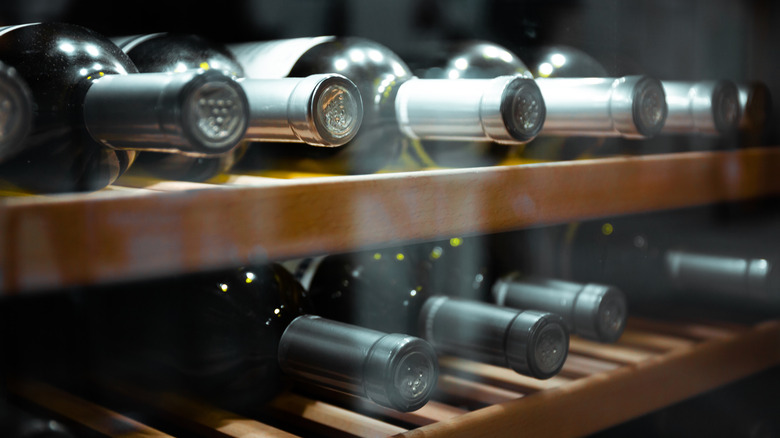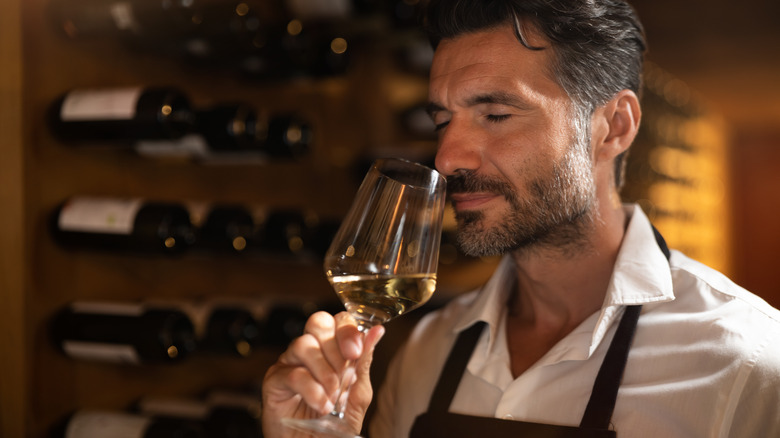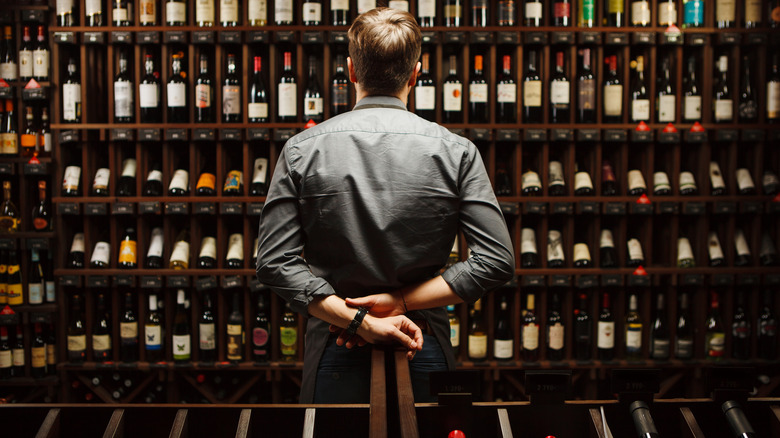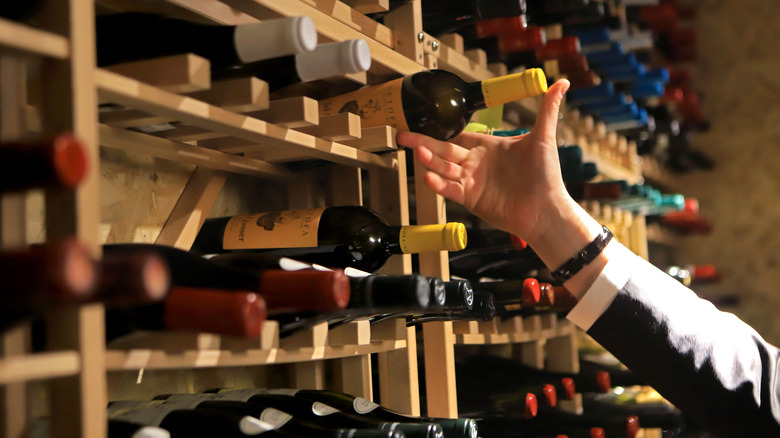Everything You Need To Know About Aging Wine
If you're a wine lover, chances are you may have at one point dreamt of having a picture-perfect cellar packed with exquisite bottles that you can go through whenever a special occasion arises. Maybe you love the idea of buying a case of a particularly meaningful wine to open ceremonially throughout the course of a decade or more, or maybe you envision having a special bottle or two set aside for a milestone, something you know will be lingering in your cellar for 50 years, until that momentous birthday or anniversary arrives.
Whether you actually achieve your dream of creating a wine cellar in your home, or if you just invest in a few items like a wine fridge and humidifier to achieve the right conditions for proper aging, there's a lot to unpack when it comes to aging wine. For many wine lovers, it's still a bit of a mystery — sure, you may have seen particular bottles from decades past going for tens or even hundreds of thousands at auctions, but what exactly makes them so special and so deserving of such a staggering price?
Aging wine can have an impact on everything from the taste to the color to the texture. Additionally, it's kind of like taking a sip of history as you taste what a certain vineyard produced under certain conditions in a particular year, and how that's changed with age. Here's everything you need to know about the complex and multi-faceted world of aging wine.
Why should you age wine?
As Master of Wine Anne Krebiehl wrote for Wine Enthusiast, "some wines take time to reveal their true nature." When you sip a wine fresh, meaning within a year or two of when it's been produced and bottled, you can taste what's called the primary flavors within the wine, which are the most prominent flavor notes. These are often things like the juicy, fragrant red fruit notes you notice when sipping a glass of Beaujolais, or the herbaceous grassiness of Sauvignon Blanc. A wine that has aged, on the other hand, will reveal what's called the tertiary notes. These are flavors that are sometimes masked by the strong primary flavors, but when allowed to shine, can really add something special to the mix. The texture of wine also changes as you age it. Many red wines develop a bit of a smoother texture over time, while white wines develop a slightly different mouthfeel, with a bit more viscosity to the body of the wine.
Aside from the wine itself, which can develop some more complex and nuanced flavors as it remains bottled over the years, aging wine can also be perfect for celebrations (via Eater). While there's absolutely nothing wrong with picking up any bottle for a special occasion, finding a vintage wine from the particular year you got married to celebrate an anniversary, or from the year you were born to celebrate a milestone birthday, can be incredibly special.
Which wines are suited for aging?
In your quest to explore the world of aging wine, don't get overzealous and tuck away every bottle you buy with the hopes of drinking an enhanced version down the road. According to Vinepair, only about 1% of wines produced are actually meant to be aged; the vast majority are designed to be enjoyed within the near future of when they're produced — within about five years, give or take.
While it's not an exact science, there are four general traits that typically indicate a wine will age well (via Wine Folly). The first is the level of acidity in the wine. If a wine has a higher acidity, it tends to age well. The second is tannins, which is another reason many assume that red wines are automatically more age-worthy. Wines high in tannins generally age better, although there are plenty of white wines that age beautifully because they're very well-balanced to begin with, and those qualities are just enhanced with time. The third general trait is the alcohol level. While fortified wines with high alcohol levels age magnificently, in wines that aren't fortified, you ideally want a lower alcohol level (Wine Folly suggests something below 13.5%) in order to avoid the wine becoming vinegary over the years. Finally, you'll want to look at the residual sugar within the wine you're considering aging. Though you may be a fan of dry wines, it's actually sweet wines that tend to age best.
How should you age wine?
Don't have a dedicated wine cellar? That's okay. Aging still isn't totally out of the realm of possibility. There are a few key components you need to consider when finding the right spot to age your beloved bottles.
The first is the temperature. Bottles that are destined for aging should be kept around 53 to 57 degrees Fahrenheit (via Wine Enthusiast). This is crucial to the aging process, because it helps keep all those complicated chemical reactions within the bottle going at a steady rate. If the temperature is too high and those reactions take place too quickly, the wine can get ruined. You also need the space to be dark, as ultraviolet light can harm the wine as well, causing the organic compounds within the wine to degrade (via Vintage Cellars). This can even be achieved by ensuring you have solid doors on wherever you store your wine, doors that light cannot penetrate.
The last piece of the puzzle, and sometimes the hardest to control, depending on the climate where you live, is humidity. For storing and aging wine, you want a humidity level of about 70%. The humidity factor is primarily important for wines that have a cork. Too much humidity, and mold may form around the cork; too little, and it will dry out, potentially cracking and exposing your wine to oxidation.



